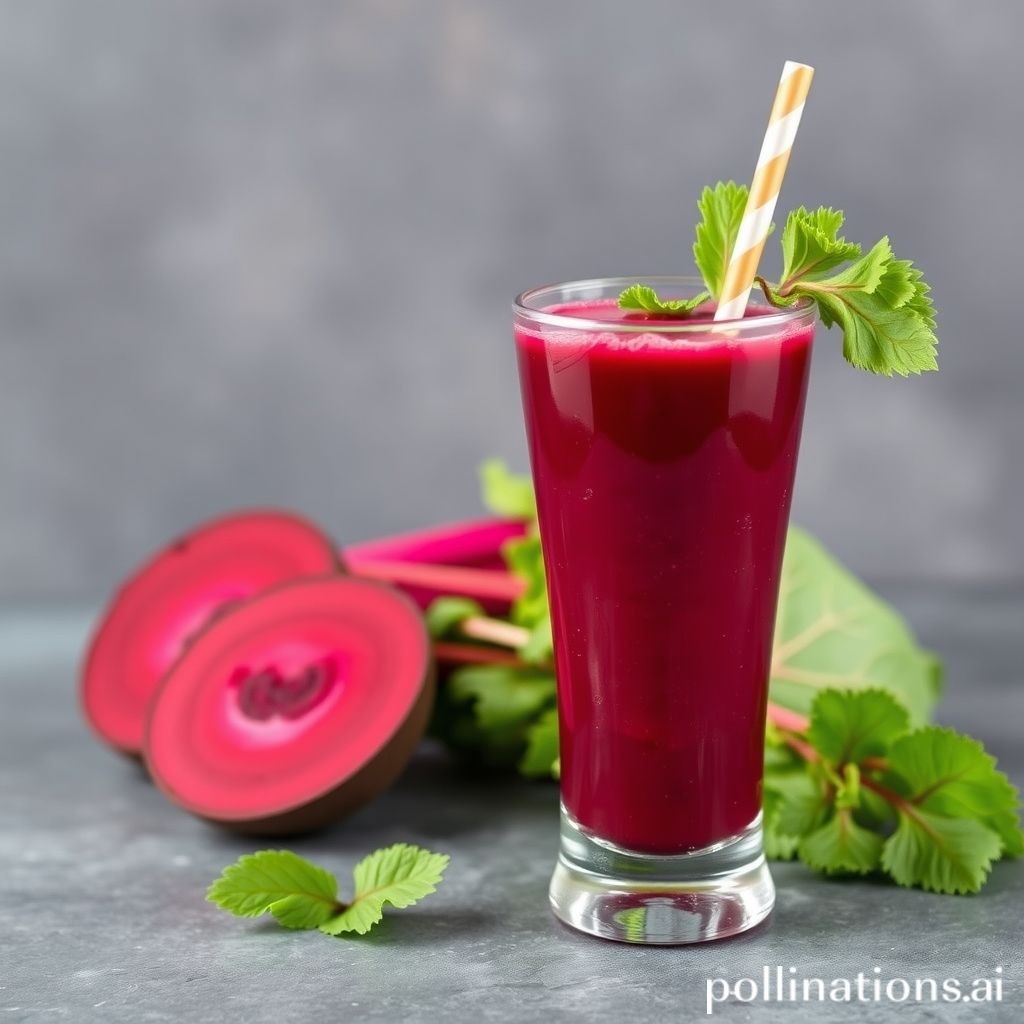How Long Does Fresh Beet Juice Last?
A 2021 study in Food Science & Nutrition explores the potential of beets to lower blood pressure. The researchers suggest that the effectiveness of beets in reducing blood pressure may vary depending on certain factors.
According to the study, beet juice has shown to be more effective than beetroot in lowering blood pressure, possibly due to its higher concentration. Additionally, the study indicates that individuals with untreated hypertension may experience the greatest benefits from consuming beet juice. In contrast, if you are currently taking medication for high blood pressure, the impact of consuming beets may not be as significant. Now, let’s address the pressing question: How long does fresh beet juice last?

Table of Contents
Discerning the Shelf Life of Fresh Beet Juice
Factors Affecting the Shelf Life of Fresh Beet Juice
Fresh beet juice, like any other perishable food item, has a limited shelf life. To determine how long you can safely consume it, it’s important to understand the factors that affect its longevity. Several key elements influence the shelf life of fresh beet juice:
- Storage Conditions: Proper storage of fresh beet juice is crucial for its longevity. It is recommended to store it in airtight containers in the refrigerator at temperatures below 40°F (4°C). This helps slow down bacterial growth and preserves its freshness.
- Processing Methods: The method used to extract beet juice can impact its shelf life. Cold-pressed beet juice, which involves minimal heat exposure, tends to have a longer shelf life compared to pasteurized or heat-processed alternatives.
The Importance of Proper Storage for Freshness
To ensure the freshness and nutritional value of fresh beet juice, proper storage is crucial. By abiding by these guidelines, you can extend its shelf life and enjoy its benefits:
- Refrigeration: Always refrigerate fresh beet juice immediately after juicing to maintain its vibrant color, taste, and nutritional content for a longer period.
- Airtight Containers: Transfer the juice into airtight containers to prevent air exposure, which can lead to oxidation and deterioration.
- Consume Within: It is recommended to consume fresh beet juice within 3-4 days of juicing for optimal freshness and nutritional value.
The Average Shelf Life of Fresh Beet Juice
1. General Timeframe for Consuming Fresh Beet Juice
Fresh beet juice can be safely consumed for a period of 3 to 5 days when stored properly.
2. Factors Affecting the Shelf Life of Fresh Beet Juice
The shelf life of fresh beet juice may vary based on several factors:
- Storage temperature: Store fresh beet juice in the refrigerator at temperatures between 34°F to 40°F (1°C to 4°C) to prevent spoilage.
- Exposure to air: Oxygen exposure can cause oxidation and bacterial growth, reducing the shelf life. It is recommended to store the juice in an airtight container.
- Quality of ingredients: Using fresh, high-quality beets and ingredients can extend the shelf life of the juice.
- Sanitary handling: Proper hygiene practices, such as washing hands and cleaning equipment, can prevent contamination and prolong the shelf life.
Please note that these factors are not exhaustive, and individual circumstances may impact the shelf life of fresh beet juice.
To maintain the freshness and nutritional value of fresh beet juice, it is advised to consume it within the specified shelf life and follow proper storage guidelines. Discard any juice that shows signs of spoilage, such as an unusual odor, changes in color, or the presence of mold.
| Factor | Effect on Shelf Life |
|---|---|
| Storage temperature | Higher temperatures can accelerate spoilage. |
| Exposure to air | Oxygen exposure can lead to oxidation and bacterial growth. |
| Quality of ingredients | Fresh, high-quality ingredients contribute to a longer shelf life. |
| Sanitary handling | Proper hygiene practices can help prevent contamination. |
Signs of Spoilage
1. Visual Indicators
When fresh beet juice starts to spoil, there are visual changes that you should look out for:
- Color change: The vibrant red hue of the juice may fade, and it might turn brownish or develop a cloudy appearance.
- Mold or growth: Any signs of mold, such as fuzzy patches or greenish spots, indicate spoilage and should be avoided.
- Separation: If the juice separates into layers with a distinct liquid and solid portion, it is a sign of spoilage.
2. Sensory Indicators
Your senses can also help determine if fresh beet juice has gone bad:
- Odor: Spoiled juice may emit a sour or unpleasant odor, indicating the growth of harmful bacteria.
- Taste: Fresh beet juice that has spoiled may have an off or rancid taste.
- Texture: If the texture becomes slimy or gritty, it is best to discard the juice.
3. Importance of Discarding Spoiled Juice
It is crucial to promptly discard any fresh beet juice that shows signs of spoilage to avoid potential health risks. Spoiled juice can harbor harmful bacteria or mold, which can lead to foodborne illnesses. Consuming spoiled juice may cause digestive issues, stomach upset, or even food poisoning.
By discarding spoiled juice, you ensure that you consume fresh and safe beet juice, preserve its nutritional value, and maintain your well-being.

Extending the Shelf Life of Fresh Beet Juice
1. Refrigeration and Proper Sealing
To extend the shelf life of fresh beet juice, it’s best to refrigerate it. Cold temperatures slow down the growth of bacteria and other microorganisms that can cause spoilage. Follow these tips for refrigerating and properly sealing your beet juice:
- Transfer the fresh beet juice into an airtight glass or BPA-free plastic container.
- Ensure the container is clean and dry before pouring the juice in.
- Leave some headspace at the top of the container to allow for expansion as the juice freezes.
- Seal the container tightly to prevent air from entering and causing oxidation.
- Label the container with the date of preparation to keep track of its freshness.
- Store the beet juice in the refrigerator at a temperature between 32°F (0°C) and 40°F (4°C).
2. Freezing
If you have an excess of fresh beet juice and want to extend its shelf life even further, freezing is an excellent option. Follow these steps to freeze beet juice:
- Pour the fresh beet juice into ice cube trays or freezer-safe containers.
- Leave some space at the top of the containers to allow for expansion during freezing.
- Seal the containers tightly to prevent freezer burn and maintain the quality of the juice.
- Label the containers with the date of freezing for easy reference.
- Place the containers in the freezer and maintain a temperature of 0°F (-18°C) or below.
3. Canning
If you prefer preserving beet juice using traditional methods, canning can be a great option. Here’s how you can can fresh beet juice:
- Prepare the beet juice by extracting it and removing any solids or impurities.
- Follow a trusted canning recipe that includes the necessary steps for preserving beet juice.
- Ensure your canning jars are sterilized and in good condition.
- Pour the beet juice into the jars, leaving the recommended headspace.
- Seal the jars with lids and bands, following the instructions provided with your canning equipment.
- Process the jars in a boiling water bath or pressure canner according to the recipe’s instructions.
- Store the sealed jars in a cool, dark place and check for proper seals before consuming the preserved beet juice.
| Information |
|---|
| Refrigerate fresh beet juice in an airtight container. |
| Freeze fresh beet juice in ice cube trays or freezer-safe containers. |
| Follow a trusted canning recipe for preserving beet juice. |
Nutritional Value of Fresh Beet Juice Over Time
1. Changes in Nutritional Content
Fresh beet juice contains various nutrients that contribute to its health benefits. Nevertheless, as beet juice ages, its nutritional content may change.
One notable change is the potential loss of certain vitamins. For example, vitamin C, which boosts the immune system, is sensitive to air and heat. Therefore, as beet juice is exposed to these elements over time, the vitamin C content may decrease.
In addition to vitamins, fresh beet juice contains antioxidants that protect the body against oxidative stress and promote overall health. Nevertheless, some antioxidants, such as betalains, may degrade over time, resulting in lower levels of these compounds in aged beet juice.
2. Impact on Nutritional Benefits
Although the nutritional content of aged beet juice may change, it still offers health benefits.
For instance, even if the vitamin C content decreases, aged beet juice remains a good source of other essential vitamins and minerals like folate, potassium, and manganese. These nutrients support various bodily functions, such as cell growth and energy production.
Furthermore, At the same time some antioxidants may degrade over time, aged beet juice still retains its antioxidant properties. Studies have shown that even after storage, beet juice can still scavenge free radicals and reduce inflammation.
3. Factors Affecting Nutritional Changes
Several factors influence the nutritional changes in beet juice over time. Exposure to air, light, and heat can accelerate the degradation of vitamins and antioxidants. To minimize nutrient loss, it is recommended to store fresh beet juice in airtight containers in a cool, dark place.
In addition, the juicing process itself can impact the nutritional content. High-speed juicers generate heat, which can lead to nutrient degradation. Using a slow juicer or cold-press method can help preserve more of the nutrients in beet juice.
Conclusion
Consumers often wonder about the shelf life of fresh beet juice and how long it remains safe to drink. it is crucial to consume fresh beet juice within a reasonable timeframe to ensure its nutritional value and prevent any potential spoilage.
At the same time the exact duration may vary depending on storage conditions, it is generally recommended to consume fresh beet juice within 3-5 days of preparation. Remember to store it properly in the refrigerator and discard any juice that shows signs of spoilage. Enjoy the benefits of fresh beet juice By amalgamating it into your healthy lifestyle.
Frequently Asked Questions about Fresh Beet Juice
FAQ 1: How long does fresh beet juice last in the refrigerator?
Fresh beet juice can typically last for up to 3 to 5 days when stored in the refrigerator. It is important to keep the juice in an airtight container to maintain its freshness.
FAQ 2: Can I drink beet juice past its expiration date?
It is not recommended to consume beet juice past its expiration date. Expiration dates are set to ensure the safety and quality of the product. Consuming expired beet juice may lead to potential health risks.
FAQ 3: Is it safe to consume beet juice that has changed color?
If beet juice has changed color, particularly to a darker or brownish hue, it is best to discard it. Changes in color can indicate spoilage or oxidation, which may affect the taste and safety of the juice.
FAQ 4: Can I freeze fresh beet juice to extend its shelf life?
Yes, you can freeze fresh beet juice to extend its shelf life. Freezing helps preserve the freshness and nutrients of the juice. Make sure to store it in a freezer-safe container, leaving some space for expansion, and consume it within 3 to 6 months for best quality.
FAQ 5: How can I tell if my beet juice has gone bad?
Signs that beet juice has gone bad include a foul smell, mold growth, or a significant change in taste or texture. If you notice any of these signs, it is advisable to discard the juice to avoid any potential health risks.
Read Similar Post:
1. Is Beet Juice Safe During Pregnancy? Find Out the Facts
2. Is Beet Juice Safe During Pregnancy? Unveiling the Truth
